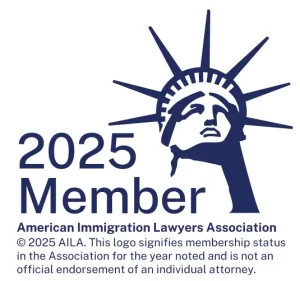
Why officer discretion makes family interpreters a costly gamble
When facing a USCIS adjustment of status interview, many applicants wonder whether they can save the $300+ cost of a professional interpreter by bringing a family member instead. While USCIS policy technically allows this under officer discretion, the practical reality makes it an extremely risky choice—especially in states like Montana, North Dakota, and Wyoming where travel distances make interview rescheduling particularly costly.
What USCIS Policy Actually Says
According to the USCIS Policy Manual, Volume 7, Part A, Chapter 5, family interpreters are theoretically permitted:
“In general, a disinterested party should be used as the interpreter. An officer may exercise discretion, however, to allow a friend or relative of the applicant to act as interpreter.”
The policy also gives USCIS broad authority to reject any interpreter: “USCIS reserves the right to disqualify an interpreter provided by the applicant if the officer believes the integrity of the examination is compromised by the interpreter’s participation or the officer determines the interpreter is not competent to translate.”
The Reality: Officer Discretion Varies Dramatically
While the policy allows family interpreters, recent practitioner experiences reveal a troubling inconsistency. Some attorneys report that officers routinely reject family members as interpreters, even adult children with perfect English skills. Others report no problems at all.
This creates an impossible situation for applicants: you have no way to predict whether your family interpreter will be accepted until you’re sitting in the interview room.
Why Family Interpreters Get Rejected
USCIS officers may reject family interpreters for several reasons:
Perceived Bias Concerns Officers worry that family members might:
- Add their own commentary rather than translating word-for-word
- Advocate for the applicant instead of providing neutral interpretation
- Become emotionally involved in the interview process
Competency Questions Even fluent family members may struggle with:
- Legal terminology specific to immigration cases
- Technical questions about forms and documentation
- Maintaining professional composure under pressure
Interview Integrity Officers want to ensure they’re communicating directly with the applicant, not filtered through someone with a personal stake in the outcome.
The Costly Consequences of Rejection
When an officer rejects your family interpreter, the interview gets cancelled and rescheduled. In our Rocky Mountain region, this creates significant additional costs:
Travel Expenses
- Montana applicants may drive 250+ miles to Helena for interviews
- Wyoming residents often travel to Denver or Salt Lake City
- North Dakota applicants frequently go to Minneapolis or Fargo
Lost Time and Money
- Hotel costs if you traveled the night before an 8:30 AM interview
- Additional time off work for you and your interpreter
- Potential delays of several months for rescheduling
- The stress of going through preparation twice
Professional Interpreter Costs Anyway Even after the rejection, you’ll still need to hire a professional interpreter for the rescheduled interview, meaning you pay the $300+ fee plus all the additional travel costs.
Professional Interpreters: The Safer Choice
Professional interpreters offer several advantages:
Guaranteed Acceptance USCIS officers rarely question certified interpreters‘ qualifications or neutrality.
Technical Expertise Professional interpreters understand immigration terminology and legal proceedings.
Emotional Distance They maintain objectivity that family members may struggle with during stressful interviews.
Reliability They’re accustomed to the formal interview environment and USCIS procedures.
When Family Interpreters Might Work
The only scenarios where family interpreters might be worth considering:
- Very simple cases with no complications or red flags
- Local interviews where rescheduling doesn’t involve significant travel
- Backup situations where a professional interpreter cancels last-minute
Even then, you’re gambling hundreds of dollars in potential costs against a $300 interpreter fee.
Our Recommendation: Don’t Risk It
After years of practice, we never recommend family interpreters for USCIS interviews. The potential savings simply don’t justify the risk, especially given the travel distances common in Montana, North Dakota, and Wyoming.
Professional interpreters are a worthwhile investment in your immigration case. When you consider the total cost of a cancelled interview—travel, hotels, lost wages, and emotional stress—paying for professional interpretation upfront becomes the economical choice.
Questions About Your Interview?
If you’re preparing for a USCIS interview and have questions about interpreter requirements or other interview procedures, contact Immigration Law of Montana, P.C. We help clients throughout the Rocky Mountain region navigate the complex requirements of adjustment of status interviews.
The small cost of proper preparation and professional interpretation can prevent much larger costs down the road.
